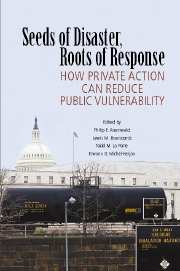Book contents
Foreword, by General Robert T. Marsh
Published online by Cambridge University Press: 30 July 2009
Summary
The nation's critical infrastructures are the great underlying strength of our country. In a word, things work. We take it for granted that when we throw the switch, the lights come on; when we turn the faucet, water flows; when we pick up the phone, we get a dial tone; when we dial 911, help arrives; and when necessary, we can confidently dispatch goods for overnight delivery to any location in the nation. These infrastructures underpin our economic strength, our national security, and our society's welfare – in simple terms, they are our nation's life support systems. It is the ready availability of reliable telecommunications, transportation, electrical power, fuel, financial, and emergency services that constitutes the solid foundation of our economy. Without ever-reliable telecommunications, power, and transportation infrastructures, our ability to mobilize and deploy the armed forces would be crippled. And finally, our modern society has become vitally dependent on these infrastructures for our most basic activities of subsistence, work, entertainment, transportation, and communications. Denial of any one of these services would cause widespread discomfort and discontent.
However, these infrastructures are not as robust as we might believe. Under continuing pressure to improve services, these systems' owners and operators eagerly pursued and incorporated the latest and best of information-age technology – computers to replace manual control, software to autonomously analyze and manipulate operations, higher communications speed and bandwidth to quickly move vast amounts of data, use of the Internet for commercial transactions and critical system control, and satellites to provide precision timing and location information for all the foregoing, to name a few.
- Type
- Chapter
- Information
- Seeds of Disaster, Roots of ResponseHow Private Action Can Reduce Public Vulnerability, pp. xi - xviPublisher: Cambridge University PressPrint publication year: 2006



